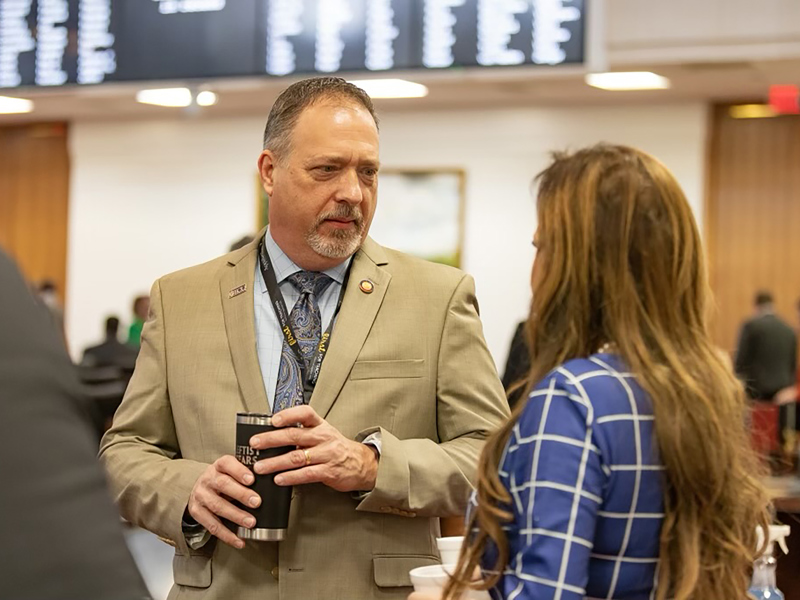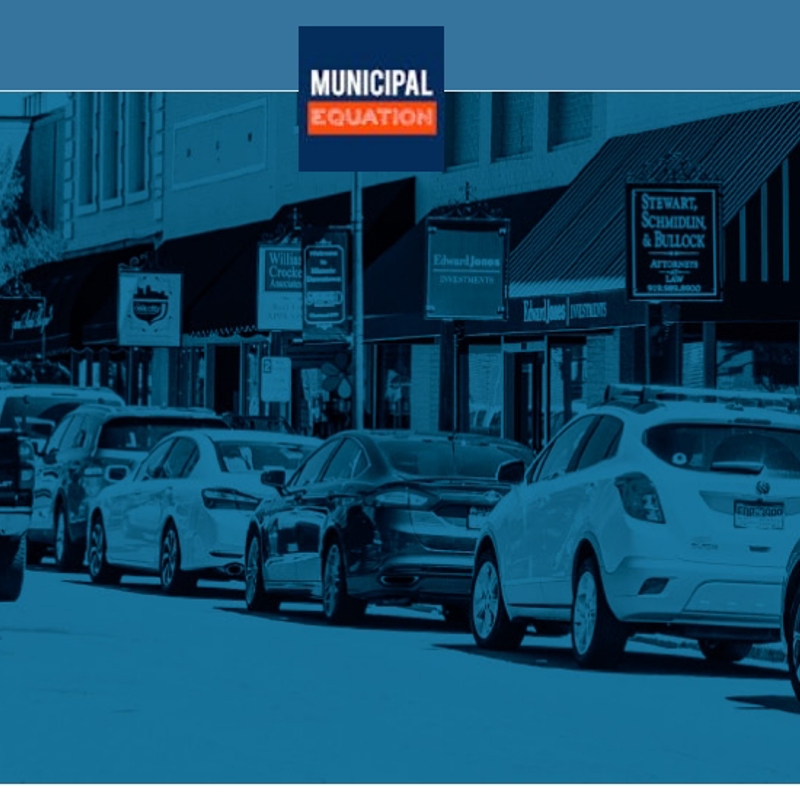Threading the Needle Together
Q1 2025 | Vol. 75, Issue 1
The northwest corner of North Carolina, filled out by the wide vistas and well-visited communities of mountainous Allegheny, Ashe and Watauga counties, is the district of Rep. Ray Pickett, elected to the state’s House in 2020. Now well into the 2025 legislative long-session, he’s accustomed to long-day efforts on assorted and surprise matters that come before the General Assembly, so many of which require considerable study on a timeframe and adding to frequent late nights. The Blowing Rock resident wasn’t new to those angles of work when he entered the legislature, though, with his professional life prior in hospitality, then owning and operating the Blowing Rock Inn. Involved with the business since high school, when his family ran it, Rep. Pickett noted in an interview with Southern City that it was all-day, multi-focused work that he’d grown accustomed to. He also applied it in his time on the Blowing Rock Town Council that preceded his House election. (Rep. Pickett’s wife, Councilwoman Melissa Pickett, presently serves on the Blowing Rock board.) And with municipal government in his background as well, Rep. Pickett is emphatic about healthy communication between entities to get things done in the legislature. He cited good, communicative relationships with local governments in his district and said it creates awareness of the needs and how to address them. “Every town in the state needs to communicate with their representatives and senators, because if you don’t have a good relationship with them, it’s hard to get things done,” Rep. Pickett said in the full interview that begins below.
~~~
Could you tell us a little bit about your district? Just to set some context on your part of North Carolina, the towns within, and where you call home.
RP: My district is fairly large. It covers three counties. It’s Allegheny, Ashe and Watauga counties. And it’s got Sparta, Lansing, West Jefferson, Jefferson, it’s got Boone, Blowing Rock, Seven Devils, Beach Mountain. So, I cover a fairly large area.
Speaking of, your professional background is in hospitality. Does that bring perspective that you find useful in state office? Thinking of economic matters like visitorship, tourism and so on. How does your background knowledge help with your role as a state legislator?
RP: Well, it means a lot, because tourism is a huge industry in North Carolina, and especially where I live. I started in hospitality when my parents bought a hotel in Blowing Rock when I was still in high school. And I have been in the hospitality industry up until 2020, and then we sold our business after I got elected. But it’s extremely important up here. It’s what this area thrives on, especially here in Blowing Rock. This has always been a tourist destination. Been for a long time and will continue to be.
Are there any aspects of Hurricane Helene that have impacted that in your district? Blowing Rock is more north of most of the aftermath imagery we’ve seen in the mountains, but in looking at broader impacts, what are you seeing at home?
RP: It has affected it, somewhat. Our business district did not get hit like it did down in Asheville and Chimney Rock, Swannanoa, and those areas. The main river, the Watauga River, is further away from Blowing Rock. So, it mostly was residential that was impacted the most. Now, some of it was tourists coming up, and there’s certain areas and roads that we try to keep them out of … just because the roads are still in bad shape, and they’re still trying to rebuild, and there’s construction people getting in and out. But the business sections are OK, and they’re back up and running.
As we speak, we’re getting into the legislative long-session. You’ve been in the legislature for multiple terms now. How do you find is a good way to get into the groove of a legislative session, which can have all kinds of dynamics and time commitments and topics to navigate? How do you get in that mode?
RP: Well, we almost stay in that mode. Even when we’re not technically in session, there’s still other things we’re working on, or we’re doing work in our districts. So, it’s pretty much full time now. And even before we started session. I was there three weeks before we started session, just starting to meet with people, start talking about some bills we might need to run, or appropriations that might need to be had, and getting the office set up and ready to go for another long-session. They all seem to run together, or they have been since I’ve been there (in the General Assembly).
So, a legislator is practically full time, you’re always absorbing information and discussing different topics with different people or groups. Is there a method to that? How do you handle intergovernmental communication, in trying to keep each other informed on context and what’s happening in the Legislative Building?
RP: Well, I have a good relationship with most of all the council members and the county commissioners. I served locally in Blowing Rock on the town council, and so I still know all of those people, so it’s fairly easy to communicate. We have each other’s cell phones, and they know that my line is open any time. All they have to do is give me a call if they have a concern, and we try to work through what we think we can do, what they might need, how maybe we can thread that needle to get to the appropriate people, if it’s appropriations, try to get to the top of the stack, and try to show that this is a need. All of my towns and the counties are very good about knowing when they come to ask for something, that they come saying, “This is a need.” They know it’s, like, this is a want, it would be nice if we could, but the needs we need first. And all my county managers and the town managers are very good about mainly coming with needs first. So, they might need some storm drain improvements after Helene came through, they might’ve found some problems that they need to address, because they want to be prepared for the next heavy rain that we have, and Helene brought out those problem spots.
Do you find that your past experience on town council colors or informs your role as a legislator at all? In terms of how you communicate, what you appreciate, and so on?
RP: I think it does. I think it gives you a real connection locally, because you did serve in local government, and you’re real in tune to the needs that those towns have.
These legislative sessions can go and go, timewise, especially in these odd-numbered years when you produce a statewide budget. There’s also storm recovery and other timely issues, wild cards, and so on. How do you find is an effective way to navigate and keep a positive momentum? Do you have moments to unplug and reset?
RP: You’ve got days in the legislature that are incredibly long, and sometimes, with so many subjects, you have to go from one subject to the next all day long, and it can be draining. But usually we try to take some time, even sometimes during the day. I’ll tell my legislative assistant to just give me 15 minutes, let me close my door for a little bit, and just be quiet for a little bit, and maybe even let’s do a little music, and just relax a minute, and then start back. You have to do that when you’re in a job like that, because it’s not a nine-to-five job. And even after five o’clock, we still have all the receptions they have in Raleigh, with people that have organizations that you feel strongly about, so you feel like you do want to go and interact with them, because they are people that you enjoy the subject that they’re on, and you’d like to help them. But usually those are a little bit more relaxed, because they’ll have them a science museum or something like that, so it’s a little more relaxed atmosphere—still talking business, but you have a little bit of time to unwind. I have an apartment in Raleigh and I can go back there and turn on the TV and just relax a little bit. You have to learn how to do that, and being in the hospitality industry, I think, helped me. That’s not a nine-to-five job either. It was always on hotel runs, 24/7. Hey, I think I got adapted to it.
You have your own subject matter expertise, like with your professional background and things you probably learned in prior public service, on the town council. How do you absorb issues that might be new for you since you first got elected to the House? You get assigned to different subject-matter committees, and you had mentioned the array of subjects you have to move through each day.
RP: Somewhat, you know. With some of it, there was a learning curve. I got to lean on staff or either their department to go talk to them to learn the ins and outs. I think transportation was one. I was in my first term. I was on (the House Standing Committee on Transportation)—still am on Transportation—and got to learn the ins and outs of how we fund transportation and how we work transportation. That was something I didn’t know a lot about. So that was something I had to just go find the information and get with people that had been in it for a long time, and they’ll put you in the right direction. So go talk to this person and they can show you exactly how it works. And I did that with universities as well. I’m chair of the (House Standing Committee on Higher Education), and a lot of people don’t understand the ins and outs of how our higher education system works, and where the money comes from, and how it’s allocated, and how the Board of Governors plays a role. So, you have to depend on the people that have been there before you to help inform you, but we have staff members that can help you along with that. And there’s people at the Department of Transportation that can help you with transportation to explain it to you. So, you just have to go out and find it.
Other than the main priorities in legislative sessions, are there any particulars or matters you’d like to see accomplished in your House service?
RP: I’d have to say that first term I came in, transportation was a priority and that’s the reason the (House) speaker at that time put me on Transportation, because I’d expressed that desire, because of what we have up here. It’s unique, in the mountains, in fixing transportation. I have a tremendous amount of unpaved state-maintained roads in my district, and keeping those maintained was very difficult. So that’s the reason I wanted to be on the Transportation committee, so I could see what I could do to help that along to keep these roads better maintained. And it’s a continuous fight. I have more calls about roads than anything else, still to this day.
Is there any advice or wisdom you’d like to share with regard to intergovernmental communication, or adapting to new topics together, or effectiveness between local governments and their legislators?
RP: Well, the main thing is to communicate with your senator and your representative. I mean, you have got to have an open line of communication with them at all times. And if you’re having a problem with something in your town and you want to change something, call them, talk to them, invite them to a council meeting. You know, we try to get around to those meetings, but sometimes it’s very difficult with our schedule in Raleigh. We’re in Raleigh when they’re having their meetings. But local governments should invite them to come sit down and talk about the problem they’re having. Don’t assume that (area lawmakers) are just going to know, because we do have a lot on our plate. So, communication is key, and I’ve been a part of the League for a long time, and Blowing Rock is still heavily involved in the League. Use it use your communication skills, and if you don’t know or if you don’t think you can articulate what you need, call the League. They’re in (the Legislative Building in Raleigh) every day. Use their expertise to come talk to us about what you might need, and it might be something as simple as a local bill could take care of what you need and not have to do it in a statewide bill that affects Blowing Rock in a way that may affect (another town or region) in a completely different way. So, try to be cognizant of that when you want something done because the statewide bill affects everyone. So, I think that communication is always the number one thing.
Let’s close out this conversation with some takeaway thoughts. What should we focus on, what’s in the air, or what do you think deserves a little more emphasis at this moment?
RP: Right now, it’s just Helene recovery. I mean, I know that we still have an entire state to run, but Helene recovery is the top priority. It’s very difficult, because of precedents from previous storms and how we can work this and stay within our Constitution and our laws of what we do. But I just always want to emphasize the communication part. Every town in the state needs to communicate with their representatives and senators, because if you don’t have a good relationship with them, it’s hard to get things done. So, you need to keep good communication. If you have a chance to come to Raleigh, call (your legislators’) offices, come sit down with them for a minute and talk to them Come see them in Raleigh. I know the League’s got their (Town & State Dinner, which groups local leaders with their legislators so they can share a meal and conversation). So that’s good, as well coming to Raleigh as a group. We used to do it when I was on council. I did it every year. We came down and we had our legislative days and went to our senator and representative’s offices and sat and talked to let them know our concerns. Any municipality out there: use the League’s expertise. That’s what they’ve got. So, I encourage every town. You’re a member of the League? Use them. That’s what they’re there for, is to help you through the process of bridging that gap between local and state. I encourage them to do that because we (legislators) can’t know everything, and it’s so hard for us even just to go through just the hundreds and hundreds of bills that are flying around that building and trying to know what all of them are. It’s difficult if we don’t hear from you. We don’t have the time to call each individual one of you and just see if you’ve got a problem. Get that problem taken care of before it becomes a big problem.







